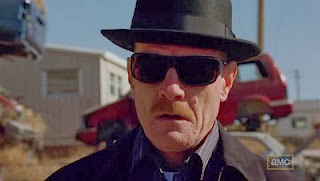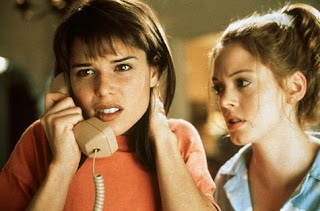Why Breaking Bad is Better than Most Movies - Part 2
--DISCLAIMER--
Please Be Advised: While I will do my best not to reveal any spoilers within this series of posts, I cannot 100% guarantee that it will not happen.
--READ AT YOUR OWN RISK--
"I have spent my whole life scared, frightened of things that could happen, might happen, might not happen, 50-years I spent like that. Finding myself awake at three in the morning. But you know what? Ever since my diagnosis, I sleep just fine. What I came to realize is that fear, that’s the worst of it. That’s the real enemy. So, get up, get out in the real world and you kick that bastard as hard you can right in the teeth." Walter White
People have complained about the subject matter or thematic elements of Breaking Bad, but I would imagine the hardest reality to accept is that a majority of what takes place in Walter White's world strikes a little too close to home. It's not surprising, either. When a friend was recently recommended to watch the show, her reaction after the first episode was a little less than enthusiastic. She responded with a heartfelt desire for "a show about the good in the world. We seem to be running a little short on that in both the fiction and non fiction genre."
Her response is valid and completely understandable. This show is not for everyone. But there are also others who complain just for the sake of content who have obviously forgotten that as members of the human race, we have been subjected to countless stories of tragedy and the evil of humanity (both fiction and non fiction). For those who are still confused by this, please take the time to research the works of the William Shakespeare and get back with me.
2. The Writing
The best thing that the group of writers did for its Breaking Bad audience was to not treat them like idiots. They never made things straight forward and simple. They never followed a standard formula. They took great leaps to introduced plot elements at the beginning of each season in which they themselves didn't even know what the end result(s) would be. For example: when Walt opens the trunk to his car in "Live Free or Die", neither the writers (including Vince Gilligan, the shows creator) or the audience knew who the M60 machine was intended for. The characters who wound up on the business end of it had not yet been created.
The writers also mastered the storytelling technique of "show, don't tell" throughout the entire series, where rather than moving the plot along with drawn out exposition, the audience would experience the story through the characters actions, their dialog, and their senses. They also satisfyingly wrote several episodes in a non-linear format, where the viewer was introduced to images and events before they even occur. This form of storytelling forced the audience to think ahead and to wonder what events might eventually lead to what was foreshadowed at the beginning of a particular season.
Nevertheless, the most interesting and compelling part of Breaking Bad was how its viewers express their opinions on when Walt was still Walter White, when he turned into Heisenberg, along with everything else in between. A lot of what Walt did or didn't do was all a matter of viewer interpretation and opinion. In a recent article for Time, Thomas Schnauz, a Breaking Bad staff writer from season three on, expressed that he always wrote Walter White as his Scarface-equivalent, Heisenberg. While he felt that his opinion on the character was always open to debate, Schnauz wrote scenes where he "believed [Walt] was Scarface (or in our world, Heisenberg) pretending to be the man society expected him to be. Cancer gave him an excuse not to pretend anymore. And I think, for all the “evil” Walt has done, that’s why we watch and identify with him. All of us, in some aspects of our lives, pretend to be something we’re not."
Stay Tuned for Part 3 Coming Soon!




Comments
Post a Comment